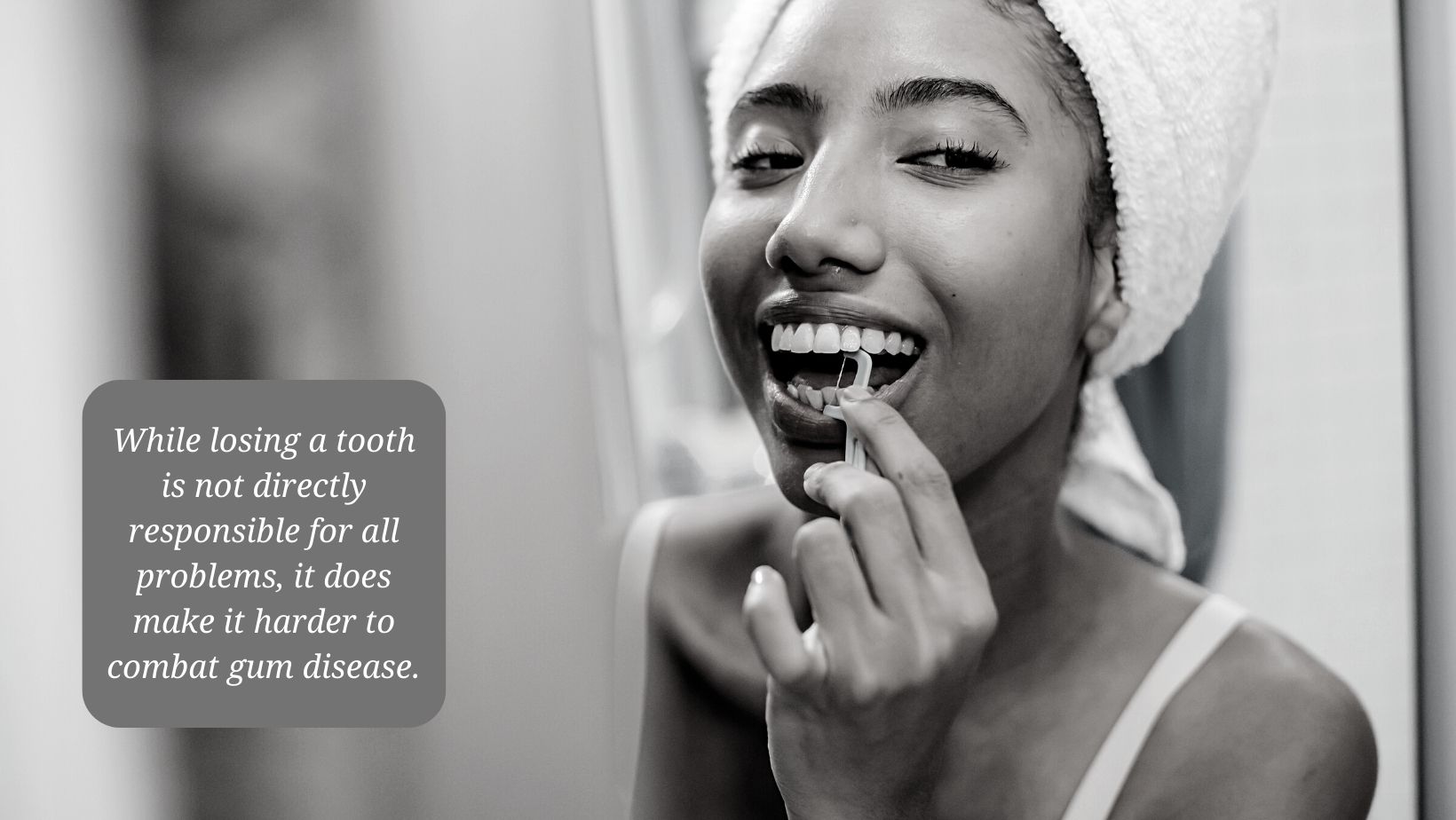When it comes to ruining a smile, a missing tooth is about as bad as it can get. But the problems with missing teeth go way beyond how a person looks or the embarrassment they might feel. The situation can lead to other significant dental problems. Those, in turn, can cause health issues.
A gaping hole where a tooth should be is not only unattractive, it can be dangerous. Missing teeth cause health problems—not directly, but by making things like periodontal (gum) disease more likely. Once certain oral diseases take hold, they in turn contribute to a number of serious medical conditions.
Whether a dentist pulled the tooth or it was somehow knocked out, the advice is the same: It is best to replace missing teeth promptly before they cause additional damage, both to the mouth and the rest of the body.
The Effects of One Missing Tooth on the Whole Mouth
Can a single missing tooth really cause much damage? Especially if someone loses a molar that no one can see, they might wonder “what’s the big deal?” The temptation might be to simply adjust to chewing on the other side of the mouth and ignore the problem. Unfortunately, missing teeth can change the entire shape of your face. Plus, there can be bigger dental problems down the road.
Speech and Eating
After losing a tooth, a patient might lisp or slur their words depending on the location of the tooth-gap in the mouth. It may also be difficult to eat. The loss of front teeth will make biting into things like fruit or corn-on-the-cob awkward or painful. Molars have their own problems by making heavy chewing difficult. Several missing teeth can make eating so challenging that some patients may experience weight loss or even malnutrition.
Shifting
Teeth move, otherwise, braces and other orthodontia wouldn’t work. When there is an empty space, teeth will naturally shift to fill it. A smile that was once straight will get crooked and uneven as time passes. Teeth may also move into positions where it is harder to clean between them, encouraging bacteria to settle and cavities to grow.
Irregular Bite
All of that shifting can eventually cause an irregular bite. These are called malocclusions, or underbites, overbites, or crossbites. Imagine walking in shoes with heels of different heights. Eventually, this bothers the legs and hips. In the same way, the lack of stability and symmetry caused by a missing tooth cause pain in the form of headaches or TMJ. It also makes night-time bruxism (teeth grinding) more common.
Bone Loss
Just like muscles need to be used to stay healthy, bone will weaken if it is not stimulated. When there is a tooth missing, the jawbone in its space won’t get the benefits of movement that come with biting down and chewing. Eventually, the bone can deteriorate and become brittle.
More Tooth Loss
A weakened jaw bone from a missing tooth means that the other teeth are at risk too. Starting with those closest to the space, they can become loose at the root, crack, or fall out completely.
Gum Disease
A missing tooth leaves an open pocket in the gum that can allow in bacteria. This may result in an infection or gum disease called periodontitis. Gum disease is the main route through which diseases are brought to other parts of the body. Serious and even deadly medical conditions can result once periodontal disease spreads.
The most alarming thing about all of these dental conditions is how rapidly they occur once a tooth is gone. One missing tooth can be the start of things going wrong in the mouth at a faster pace than would normally happen. All the more reason to do something about a missing tooth as soon as possible.
The Dental/Medical Connection
So what do things like an irregular bite and affected speech and eating patterns have to do with a person’s overall health? It may not seem obvious at first how connected dental health is to physical health.
But consider: Our mouths are entry points to our respiratory and digestive systems, and are filled with both good and bad bacteria. It makes sense that what happens there can affect other parts of the body.
Medical and dental researchers have been studying the relationship between oral and general health for decades. The Mayo Clinic and the University of Illinois Chicago College of Dentistry have both published articles discussing the link between dental health and overall wellbeing. Harvard Medical School reports on studies linking gum disease to coronary heart disease. They cite research done by the NCIB (National Center for Biotechnology Information) which has covered the connection of poor oral health and tooth loss to specific ailments as well as general health. Research is ongoing, but doctors and dentists agree that there is, indeed, a connection.
When it comes to disease in other areas of the body the most destructive dental issue is periodontal disease. Gum disease, when left untreated, is responsible for a number of dangerous conditions such as:
- Endocarditis
- Cardiovascular Disease
- Respiratory Ailments and Pneumonia
- Pregnancy and Birth Complications
While losing a tooth is not directly responsible for these problems, it does make it harder to combat gum disease, which can give these diseases a head start.

There are several other conditions linked to periodontal disease and generally poor oral health, although it is not always clear if they are the cause or the effect. People who have diabetes, osteoporosis, HIV/Aids, and Alzheimer’s disease suffer from a pronounced decline of their dental health. This decline can lead to tooth loss, and tooth loss can lead to poor oral health. Regardless of which came first—the disease or the missing tooth—replacing teeth is a good idea for both dental and medical reasons.
Don’t Wait to Replace Missing Teeth
When facing the problem of missing teeth, patients can opt for a dental bridge, dentures, or dental implants.
A dental bridge is a false tooth held in place by the teeth on either side of the space. Dental crowns are placed on those teeth, with the false tooth (or teeth) attached.
Dentures are a set of removable false teeth. They typically include the entire set of upper or lower teeth, rather than just one or a few like a bridge.
Dental implants are false teeth that are permanently attached to the jaw with the use of a titanium post. While the procedure is more invasive than the other options, it is safe and has a high success rate. Implants have become increasingly popular in recent years because of their natural look and feel that closely resemble real teeth.
The Cost of Tooth Replacement
Getting “new” teeth in the place of missing ones can be expensive. Dental implants are more pricey than bridges and dentures, but people often prefer the freedom of a permanent solution. Unfortunately, dental insurance may not cover the cost of any of these solutions.
When cost is a concern when restoring missing teeth, there are options to make bridges, dentures, and implants more affordable. Some things that might help with the cost:
- Dental practice promotional specials such as back-to-school offers or discounts (for military personnel, first responders, etc.)
- Dental practice payment plans
- Credit cards specifically for medical and dental procedures
- Health Savings Accounts or Flexible Spending Accounts offered by employers
- Dental schools
- Travel to a less expensive provider in another city
If you are missing one or more teeth and need a dentist, use our online search tool to find one near you.
Replacing lost teeth is an investment. But your dental and physical well-being is valuable. Safeguard both by not waiting to replace your missing teeth.


